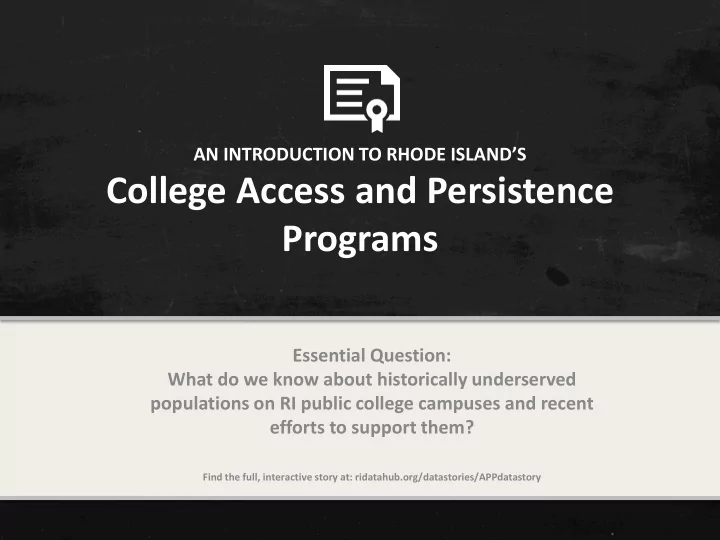

AN INTRODUCTION TO RHODE ISLAND’S College Access and Persistence Programs Essential Question: What do we know about historically underserved populations on RI public college campuses and recent efforts to support them? Find the full, interactive story at: ridatahub.org/datastories/APPdatastory
RI's public colleges expand efforts to support "historically underserved" students Nationally, as in Rhode Island, certain groups of students have been disproportionately under-represented on college campuses. Minority youth, students with special needs and especially those who've been raised in poverty find that college is out of reach for them. This story examines the new programs that RI's three public colleges have recently implemented, building on existing efforts. While they're new, are they beginning to have a positive impact? If so, what seems to be working? An Introduction to Rhode Island’s College Access and Persistence Programs
Who is enrolling? The Class of 2012 Composition of graduating class 48% 31.5% 31.2% 49.3% 43% 20.4% 8.3% % of class in each group 60 College Enrollments % any 40 postsecondary enrollment 20 % no known enrollment 0 Free/ Minority Core Male Chronically IEP English Reduced City Absent Language Price Lunch Learner An Introduction to Rhode Island’s College Access and Persistence Programs
Real students facing real challenges “My mother never spoke to me about college specifically until my brother entered high school. And even then she never spoke about the logistics.” “When I got to CCRI I was terrified. With all the deadlines and emails I was quickly overwhelmed. There was no one around to help me.” “I didn't really feel prepared for college once I started all of my classes with different students. I questioned the way I learned in high school and compared it to how I would learn in college.” An Introduction to Rhode Island’s College Access and Persistence Programs
Who we serve Pre-college Community Partners College Based Programs 100 80 60 40 20 0 % of College Crusades College Visions Connect to College (C2C) Learning for Life (L4L) Project Recruit & Educate Students CCRI RIC Local At‐risk Adults & Youth (RELAAY) URI Free/Reduced Lunch Core City School An Introduction to Rhode Island’s College Access and Persistence Programs
Strong partnerships 100 Participation of Students from Community Partners (Year 1 and Year 2) 80 60 40 20 0 Year 1 Year 2 Year 1 Year 2 Year 1 Year 2 C2C (CCRI) L4L (RIC) RELAAY (URI) College Crusade Students College Visions Students An Introduction to Rhode Island’s College Access and Persistence Programs
Academic successes Year 1: Grade Point Average Year 1: Average Credit Completion Ratio 100 100 85.99 3.0 to 4.0 78.34 25.85 31.63 80 80 42.09 2.0 to 3.0 63.2 60 60 1.0 to 2.0 55.38 41.09 40 40 40.74 Less than 1.0 20 20 18.6 No or Unknown 13.38 17.85 2.33 GPA 1.92 6.36 0 0 1.87 C2C, L4L, Non-Participant All Remaining C2C, L4L, Non-Participant All Remaining % of & RELAAY Peers Students Students & RELAAY Peers Students An Introduction to Rhode Island’s College Access and Persistence Programs
Persistence Persistence to a Second Semester and a Second Year FALL 2012 Into SPRING 2013 Into FALL 2013 96% 100 C2C, L4L, & 87% 88% RELAAY 80 All Remaining 77% Students 81% % of Students 60 Non-Participant 59% Peers 40 0 An Introduction to Rhode Island’s College Access and Persistence Programs
Take-aways and recommendations Clearly, partnerships among college access and postsecondary support programs successfully smooth students’ transition to college and coordinating comprehensive services while in college enhances their chances for success. • Coordinating comprehensive systems of support, especially during the vulnerable transition from high school to college, needs good longitudinal data. Such data will help all partners work together to achieve their common goals for student success. • Already further study is needed to identify which core services and institutional policies are having the greatest impact on these students. • Sustaining the program-supports over the course of some student's college careers will be essential to ensure that they reach completion. • Since many more students could benefit from these comprehensive services, expanding and sustaining the programs’ success will require finding other sources of funding. See more at: ridatahub.org/datastories/APPdatastory An Introduction to Rhode Island’s College Access and Persistence Programs
Recommend
More recommend